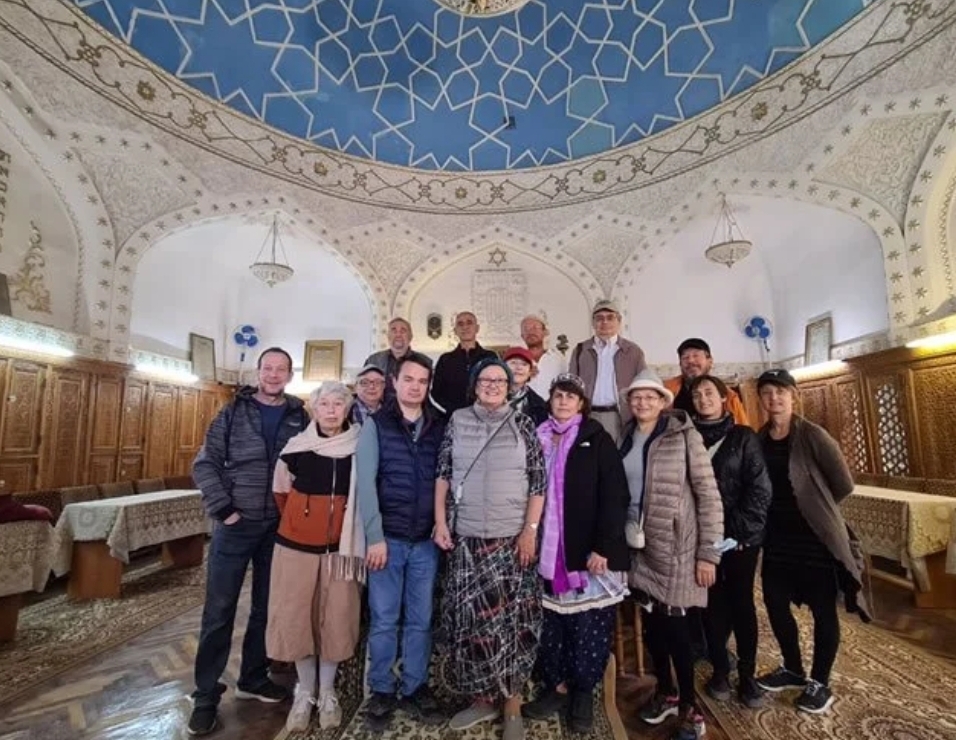During World War II, thousands of Russian nationals fled to the Asian part of the former Soviet Union. Along with these evacuees, there were many Jews who found temporary homes and safety in this particular region and who were embraced with kindness.
I personally heard many stories of generosity that the local Uzbeks displayed towards the refugees, and I always hoped to visit this corner of the world. Recently, my husband and I joined a group of international Jewish travelers in Uzbekistan, planning to visit its major Jewish synagogues and cemeteries, as well as neighborhoods and markets where Jews once lived and worked.
Despite the fact that our group members were currently living in different countries, we were all born in the former Soviet Union and were now reconnecting to our Jewish heritage.
One of the highlights of our trip was the Shabbat we spent in Bukhara. This experience was particularly poignant because one member of our group, Elina, received her Jewish name there at the Torah. She made this conscious decision to accept a Jewish name as yet another step towards reconnecting with her Jewish identity. We celebrated her milestone together in a small Bukharian synagogue, surrounded by fellow Jews from around the world, feeling the incredible unity of our heritage.
Elina and her husband, Michael, who now live in Düsseldorf, Germany, were born in Moscow. Elina’s paternal grandfather served in the Russian tzar’s army. As a Cantonist, he was granted a special permit to live in a large city. After the 1917 Communist Revolution, Elina’s family became part of Communist society, and during World War II, her father served in the Soviet army.
Elina had a typical Soviet childhood, immersed in an atheist culture with little understanding of her Jewish identity. In the early 1990s, after the fall of the Soviet Union, Jewish educational opportunities opened up throughout the country. Unfortunately, after more than 70 years of Communist propaganda, people were reluctant to take part.
Elina and her family immigrated to Düsseldorf in 1990 and, soon after, she began to explore the question of her identity. In 2005, they traveled to Israel for the first time. This trip brought a clarity that Elina had never experienced before.
“I had a feeling of total peace and joy in knowing that I was home. By Divine providence, each of our trips to Israel fell on a Jewish holiday, even though we had not planned it that way. Our first journey fell on Sukkot, and we joined our family in Jerusalem for our first meal in the sukkah. Our next trip was during the festival of Purim. When my husband asked a stranger in the elevator if he could suggest a place to watch the Purim carnival, the gentleman invited us to his synagogue’s celebration and then to a festive meal in his own home. This man “happened” to be from Moscow, and because we had many things in common, my husband and I agreed to join the celebration. It was our first experience listening to the reading of the book of Esther. Our hosts also spoke about the gift of Shabbat. We learned about this beautiful mitzvah of unplugging from the noise of the world and reconnecting to our Creator. It left a tremendous impression on us.
“Our next trip to Israel took place during Passover. My husband has a big family in Israel, and we all gathered to celebrate the night of the Exodus. We connected, laughed and followed the steps of the Seder in three different languages. Our connection to each other transcended the language barrier. We were one people, free to be together with our G‑d.
“Soon after, I learned to say the Shema prayer and started to study Torah. I remember sitting at the computer, searching for prayers that would help me connect. I was mesmerized when I discovered the Russian Chabad.org site, and was able to learn to pray in Russian and learn Torah wisdom in my native language. I could not stop reading as these articles were transforming my understanding of life.
“Two years ago, I joined a local bat mitzvah project group organized by Jewish women from the former Soviet Union. I became an active member of the Jewish community in Düsseldorf, dedicated to the continual exploration of my heritage.”
So many seemingly unrelated milestones of our individual journeys brought our group together on that Shabbat in Uzbekistan, where we were united by our shared heritage. Together, we walked to the synagogue, celebrating Elina, who was adding her own story to the collection of our shared destiny.
After being scattered, oppressed, indoctrinated, expelled and discriminated against, on that Shabbat in Bukhara a Jewish woman was returning to her roots and ready to receive a name by the Torah. Here in Uzbekistan, where thousands of Jews found refuge during the war, we, too, added our imprints to the ancient cobblestone streets. We stood together—Jews from Israel, Germany, the United States, Russia and Ukraine—with Elina as she received her beautiful Jewish name, Leah Yael.
As our hearts overflowed with joy, we knew that regardless of where our journeys carried us, within each of us is a deep-seated Divine spark—an inextinguishable light that can always guide us back home.
The Woman From Germany Who Received Her Jewish Name in Bukhara – Stories of Return (chabad.org)

